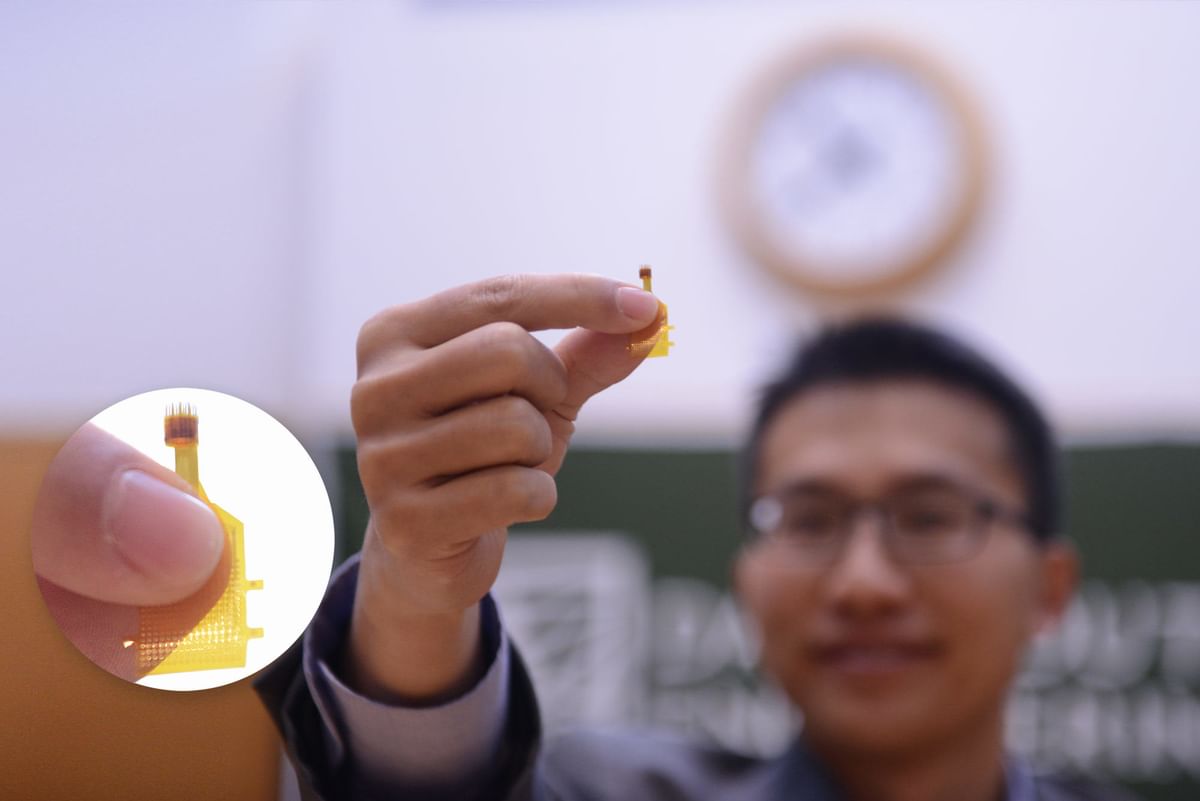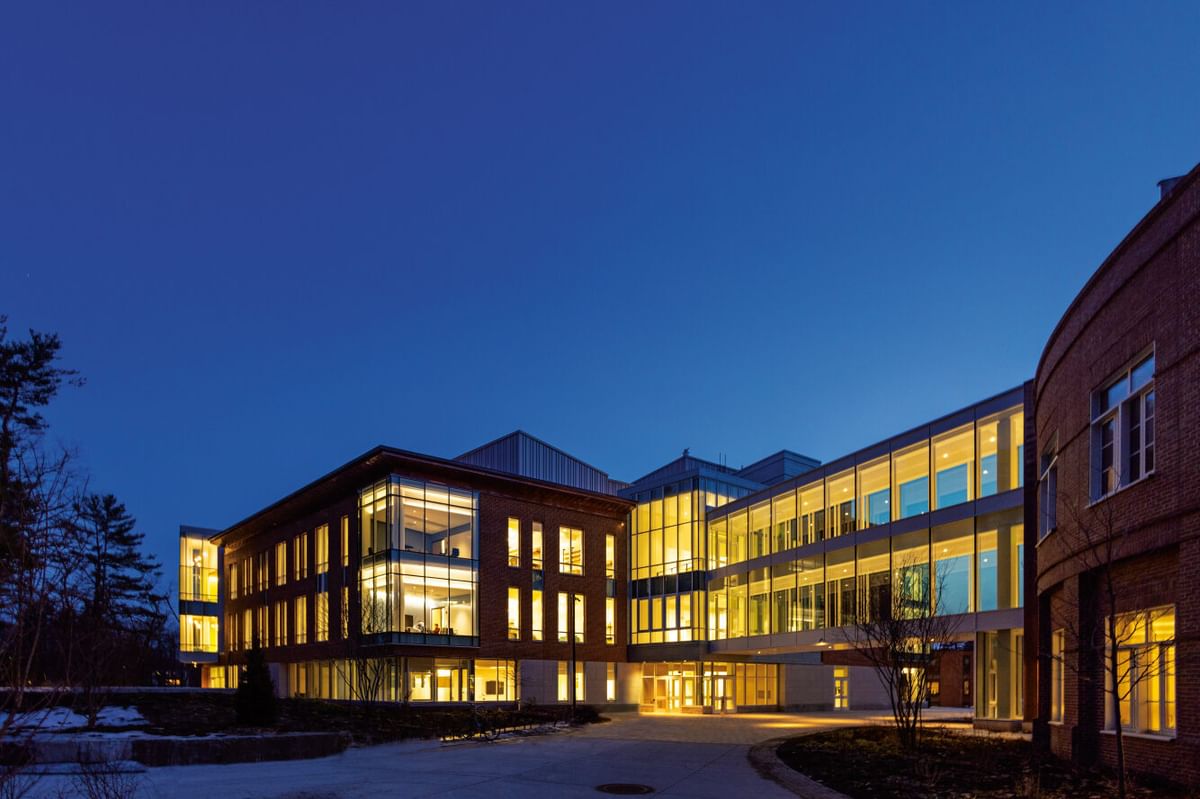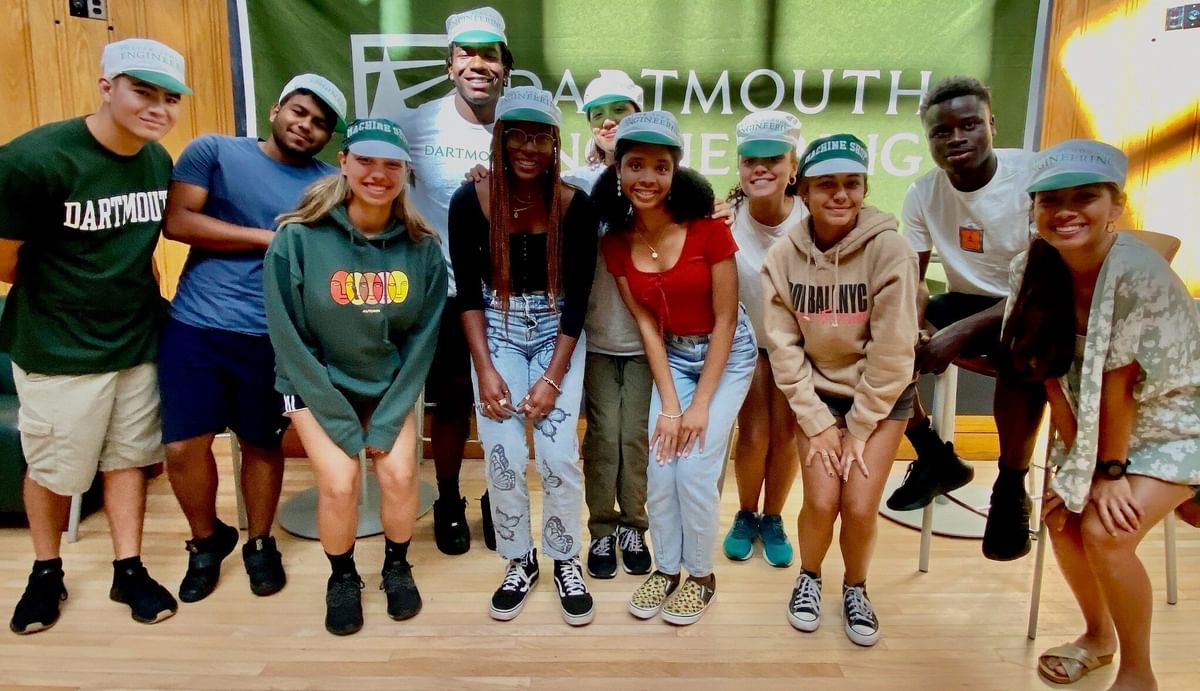- Undergraduate
Bachelor's Degrees
Bachelor of ArtsBachelor of EngineeringDual-Degree ProgramUndergraduate AdmissionsUndergraduate Experience
- Graduate
Graduate Experience
- Research
- Entrepreneurship
- Community
- About
-
Search
All Thayer News




Stories of 2022: Highlights from Dartmouth Engineering
Dec 21, 2022
Below are some highlights of the stories from our website, magazine, and across campus—from research breakthroughs to the opening of our new building—helping to advance the Dartmouth Engineering mission of teaching and research with human-centered impact.
Dartmouth to Co-lead $2.8M NIH Grant to Develop NeuroCROWN, a Next-Gen Implantable Neurotechnology
Dartmouth Engineering professor Hui Fang will co-lead a $2.8 million, four-year grant awarded by the National Institutes of Health (NIH) to develop next-generation soft electronic neural probes as a multi-Principal Investigator (MPI).

Professor Fang holds a 3D soft neural probe. (Photo by Kathryn Lapierre)
Dartmouth Engineers Develop Rapid Printing Method for More Affordable Solar Technology
A group of Dartmouth engineers has developed the quickest reliable printing method for the manufacturing of perovskite solar cells, which can be used to efficiently harness and convert solar energy. The method may help scale the use of efficient solar technology, such as electric vehicles.
Building On Innovation
If the soaring glass and brick exterior is any indication, there is something very cutting edge about the new Class of 1982 Engineering and Computer Science Center (ECSC) that has transformed Dartmouth’s West End into a new hub for innovation.

The Class of 1982 Engineering and Computer Sciences Center has transformed the West End into new hub for human-centered discovery. (Photo by Rob Strong '04)
Dartmouth Engineering Startup Awarded Phase II SBIR Grant
QUEL Imaging, founded in 2019 by a student-faculty team, focuses on the commercialization of tools and services to accelerate the clinical translation of fluorescence guided surgical systems. QUEL announced it has received a Phase II SBIR award from the National Institute of Biomedical Imaging and Bioengineering of the National Institutes of Health.
Dartmouth Engineering Students Conduct First-of-its-Kind Independent Study on Energy Efficiency in Cannabis Cultivation
Twenty weeks of research and analysis show an additional 50%+ energy and greenhouse gas (GHG) reduction potential after installing LED lighting, reducing the impact on the grid, and emerging standards for "green" cannabis.
Dartmouth Joins NSF I-Corps Hub: Interior Northeast Region
Dartmouth has joined nine regional university partners to form a new National Science Foundation (NSF)-funded Innovation Corps (I-Corps) Hub aimed at accelerating innovation and translation of research discoveries to the marketplace.
Dartmouth Engineering Awarded DOE Funding for Clean Energy Research
Dartmouth will lead the US Department of Energy (DOE)-funded effort to discover new photovoltaic materials and will also participate in two Energy Frontier Research Centers (EFRCs) which bring together multi-disciplinary scientific teams to tackle the toughest challenges in energy technologies. One will investigate the basic science of water-splitting catalyst design for clean hydrogen production, and another will explore what determines positioning preference of neighboring atoms in semiconductor alloys, towards more energy-efficient computing.
Dartmouth Engineering Helps Plan for Flying Electric Taxis—Coming Sooner Than You Think
If they build them, will people come? Dartmouth Engineering Professor Vikrant Vaze is working to make the answer be, yes. "They're building them now," said Vaze, referring to what are called electric vertical-takeoff-and-landing (eVTOL) vehicles. "The technology for fast, safe, affordable flying cars is here, but if we don't plan it right, if we don't understand how, when, and where customers will want to use them, then the industry will fail before it even gets started."

Archer Aviation's autonomous eVTOL vehicle prototype. Image courtesy of Archer Aviation
Dartmouth Engineering Receives NASA Grant to Develop Sensor Materials That Can Take the Heat
Dartmouth Engineering Professor Yan Li will lead the effort to design new materials for self-powering sensors that can withstand higher temperatures than conventional sensor materials. "For sensing, energy storage, and energy harvesting capability in space, temperature tolerance is important," says Li. "Current materials can only perform at up to 200 degrees Celsius. Above that, all functionality is quickly lost."
Dartmouth Engineering Student Is Runner-Up in Collegiate Inventors Competition
PhD student Arthur Petusseau received second place in the 2022 Collegiate Inventors Competition for his invention, "Hypoxia Imager for Surgery Guidance."
Dartmouth Engineering Study Shows Polar Ice Cracks May Be Self-Healing
A new study out of Dartmouth's Ice Research Lab shows that surface thermal cracks in ice can heal themselves within seconds, and potentially lessen the degradation of Arctic ice covers. "This work shows that, for the polar ice caps, cracking may not always lead to major breakups, and may in fact increase the floating ice covers' resilience and extend their life," says Andrii Murdza, an engineering research associate and first author on the study. "It also points to a possible mechanism for the repair of other crystalline materials such as many ceramics at temperatures near their melting points."
Dartmouth Creates $100 million STEM-X Program
Dartmouth has launched a $100 million program, Dartmouth STEM-X, to increase access for and leadership opportunities of historically underrepresented groups in science, technology, engineering, and mathematics (STEM), and prepare the next generation of leaders in these fields, President Philip J. Hanlon '77 announced at a forum for alumni, technology leaders, and entrepreneurs in San Francisco on December 6.

The EE Just Undergraduate Fellows after enjoying a tour of The Machine Shop at Dartmouth. The EE Just Undergraduate Fellowship is a two-year fellowship — held during the junior and senior years — designed to increase the number of underrepresented minorities at Dartmouth who choose to enter a doctoral program in a STEM field after graduation. (Photo by Catha Mayor)
To keep up with Dartmouth Engineering in 2023, see news updates at engineering.dartmouth.edu/news and find us on Instagram, Facebook, Twitter, and LinkedIn.
For contacts and other media information visit our Media Resources page.
